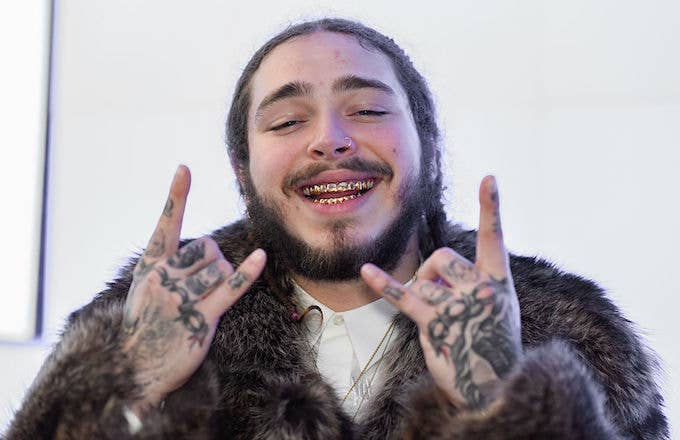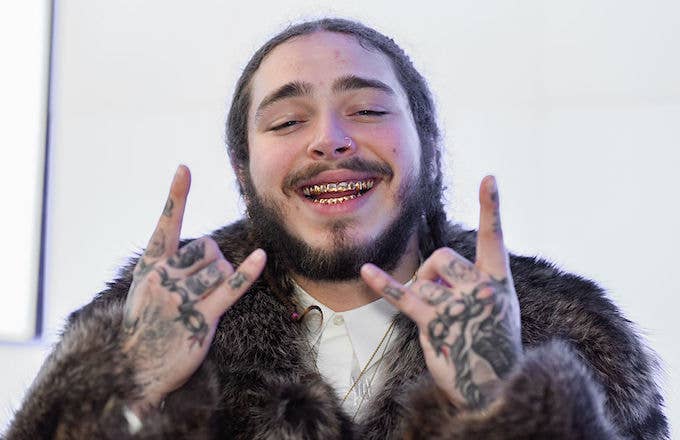
The comedy legend Paul Mooney has a very well-known routine. He delivered its most prominent version on the Chappelle Show some years ago:
“The black man in America is the most-copied man on this planet, bar none,” he explained. “Everybody wanna be a nigga, but nobody wanna be a nigga.”
What he was talking about, of course, is about the relationship between white people and black culture: whites take everything but the burden from African-Americans. Mooney’s been proven right countless times over the years. Following a year in which white people took credit for cornrows, hoop earrings, and even Latin music, we now have Post Malone.
Malone embraced hip-hop from the beginning of his career (except for those awkward early years where he played in a metal band). He rapped, collaborated with rappers, used rap slang, selected trap drums to soundtrack his beats. For this, he was handsomely rewarded. “White Iverson” blew up; he hit number one with “Rockstar.”
And yet, the Dallas-via-Syracuse Post has been running away from rap since he began reaping the benefits of the association.
In 2015, right as “White Iverson” hit, Malone declared, “I’m not a rapper—I’m an artist,” as if they were different. In 2016, he turned down a slot on the XXL Freshmen list because he was “going in more of a rock/pop/country direction.”
Of course, Post got his initial media coverage from rap-centric outlets, and his fans were reacting not to rock or country, but to the elements of his music and persona that were indistinguishable from Drake, Young Thug, 21 Savage, and other contemporary rappers. His distancing from “rapper” to the more nebulous “musician” is the sort of thing only white artists attempt—or can pull off. André 3000 can act, play instruments, sing, compose, or write cartoons until he’s blue in the face, and all anyone wants to know is when he’ll rap again. Or just take a look at the intense criticism and mockery of Lil Wayne’s attempts to play guitar and make a rock album.
Speaking of music: without trap drums, guest appearances from rappers like Quavo and 21 Savage, hip-hop slang, and the sing-song-style rapping that is the lingua franca of trap these days, Post’s earliest bursts of attention would be, to put it frankly, impossible to imagine. Songs like “Go Flex” are the same mediocre singer-songwriter drivel you can hear at any neighborhood cafe on a Wednesday night. Minus hip-hop, he’s just another long-haired songwriter with a smidgen of a sense of melody, a Nirvana cover or two in his repertoire, and an ego that far outsizes his talent.
Now, he’s in the news for making it abundantly clear he doesn’t understand or care about the music and culture he’s still using to top the charts.
“If you’re looking for lyrics, if you’re looking to cry, if you’re looking to think about life, don’t listen to hip-hop,” he told an interviewer in Poland. “[W]henever I want to sit down and have a nice cry, I’ll listen to some Bob Dylan. But whenever I’m trying to have a good time and stay in a positive mood, I listen to hip-hop because it’s fun. I think hip-hop is important because it brings people together in a beautiful, happy way. Everybody’s happy.”
I understand how artists who blow up at a young age might have a narrow view of the genre that they vampire from, but they should be careful how they flash those gold front fangs. https://t.co/SrbPu8zihM
While there’s nothing wrong with listening to Bob Dylan for a good cry (in fact, I recommendit), this shows a stunning level of ignorance about black music and culture (and, by extension, the people who make it). If you can’t find hip-hop that makes you want to cry or think about life, you’re either not looking very hard or you’re listening in a way that precludes you from hearing any emotion you can relate to. It’s hard not to see either as anything but racialized dismissiveness.
this yal man niggas disrespected me over him https://t.co/guXai28Wwz
As if one dumb-ass quote wasn’t enough, Post recently doubled down on his opinions in an interview to Rolling Stone that went even further into white fragility.
While showing off his Rolls Royce and $1,700 shoes, Malone complains that things have been very hard for him. While looking back on Charlamagne tha God’s challenge, “What are you doing for Black Lives Matter?” Post revealed that he was far more concerned with scoring rhetorical points than actually answering the question.
“I guess what I can do to help Black Lives Matter is keep making music. ... I don't know,” he said. “I wish I'd said, ‘What are you doing for Black Lives Matter?’ Some sassy shit to shut him up. Like, maybe my music's not the best, but I know I'm not a bad person, so you're just being a hater.” Malone went on to say that the radio DJ “hates me because I’m white and I’m different.” And, as if that wasn’t enough, Post goes on to say that he’s been the victim of reverse racism.
That young man said if you want the real then don’t listen to hip hop.
It’s hard to imagine the universe in which Post Malone has been discriminated against. The most viable explanation for his current spike in success is his ability to reach a much bigger—and whiter—audience than any of his contemporaries in hip-hop. He’s able use the fanbase of a music that he doesn’t give any indication of understanding or caring about as a springboard to stardom, then openly toys with abandoning the genre at the slightest provocation. He pays no attention to the literal life-or-death issues facing the communities that created that culture in the first place, then screams “reverse racism” if you even broach the issue.
Post Malone wants the fans, the Billboard hits, the fancy cars, and the expensive shoes that come from being a successful rapper. But he also wants to be able to use and discard the music, the people who make it, and the people who love it as soon as there’s a different audience to chase. He feels like he faces difficulties for being white, despite the fact that it gave him access to a mass audience few of his peers can touch. Paul Mooney was right again.


